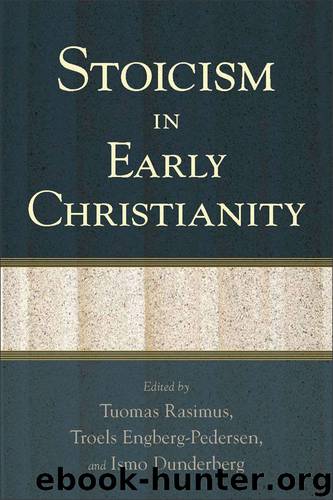Stoicism in Early Christianity by Tuomas Rasimus Troels Engberg-Pedersen and Ismo Dunderberg

Author:Tuomas Rasimus, Troels Engberg-Pedersen, and Ismo Dunderberg
Language: eng
Format: azw3
Tags: Stoics, Church history—Primitive and early church (ca. 30–600), Bible. N.T.—Philosophy, REL006220, REL006630, Philosophy and religion—Rome
ISBN: 9781441233677
Publisher: Baker Publishing Group
Published: 2010-11-01T04:00:00+00:00
* * *
9
* * *
FACING THE BEAST: JUSTIN, CHRISTIAN MARTYRDOM, AND FREEDOM OF THE WILL
Nicola Denzey
Harvard University & Brown University
God has deemed us worthy instruments of his purpose to discover how much human nature can endure.
—Seneca, De providentia 4.12
Sometime during the reign of the emperor Antoninus Pius (138–160 C.E.), a young man named Justin arrived from Asia Minor to explore the schools of philosophy catering to members of Rome’s elite: young, aimless men well schooled in the traditions of their fathers.[1] In his Dialogue with Trypho, Justin describes his long process of education and conversion to Christianity.[2] Searching for a deeper meaning in his life, the young Justin had, like many of the educated young men of his age, approached the schools of philosophy active in second-century Rome. His first foray into philosophy, so he informs us, brought him to the Stoics.[3] Justin, who already knew at least the basic tenets of various Greek philosophical schools operating in his day, was aware that the idea, for example, of the logos—so prominent in the Gospel of John—was as much a Stoic tenet as it was Christian. He admired the Stoics for their understanding that the penetrative logos had entered “into every race of humans.”[4]
But Justin quickly became disillusioned with the Stoics—or so he tells us. There were certain things, he insisted, that they had gotten completely wrong. The first was the idea of the ἐκπύρωσις, the periodic universal conflagration that eventually would completely consume the cosmos.[5] That the world could be created, destroyed by fire, then recreated in an undying cycle contradicted both Jewish and Christian notions of a created world existing within linear time. Justin reserved his most caustic criticism, however, for the Stoic position on free will. Stoics were, he asserted, firm believers in astral fatalism; human will remained powerless in the face of higher cosmic forces. Justin attributed to Stoic philosophy the view that humans could do or suffer nothing contrary to fate.[6] In his critique of this position, Justin adopted a stance, ironically, that could have come directly from the mouth of a Roman Stoic such as Seneca: “But neither do we affirm that it is by fate [καθ᾿ εἱμαρμένη] that people do what they do or suffer what they suffer,” he claimed in his Second Apology, “but that each person by free choice [προαίρεσις] acts rightly or sins.”[7]
This essay explores some articulations of Stoic philosophical positions on determinism and the human capacity for free choice as made by the Roman Stoic philosopher, statesman, and playwright Lucius Annaeus Seneca (4 B.C.E.–65 C.E.), on the one hand, and Christian martyrs, including Justin, in the second century of the Common Era, on the other.[8] I argue that Christians pursued a complex relationship with Stoic philosophy, rejecting it overtly while nevertheless embracing elements of it in a complicated pattern of rebuttals, refutations, and ultimate assimilation of Stoic ideals, even while deliberately repudiating them. To say that there were significant continuities between pagan and later Christian philosophies is an argument both
Download
This site does not store any files on its server. We only index and link to content provided by other sites. Please contact the content providers to delete copyright contents if any and email us, we'll remove relevant links or contents immediately.
The Gnostic Gospels by Pagels Elaine(2527)
Jesus by Paul Johnson(2352)
Devil, The by Almond Philip C(2325)
The Nativity by Geza Vermes(2227)
The Psychedelic Gospels: The Secret History of Hallucinogens in Christianity by Jerry B. Brown(2153)
Forensics by Val McDermid(2088)
Going Clear: Scientology, Hollywood, and the Prison of Belief by Lawrence Wright(1981)
Going Clear by Lawrence Wright(1963)
Barking to the Choir by Gregory Boyle(1819)
Old Testament History by John H. Sailhamer(1810)
Augustine: Conversions to Confessions by Robin Lane Fox(1770)
The Early Centuries - Byzantium 01 by John Julius Norwich(1740)
A History of the Franks by Gregory of Tours(1721)
A Prophet with Honor by William C. Martin(1718)
Dark Mysteries of the Vatican by H. Paul Jeffers(1717)
The Bible Doesn't Say That by Dr. Joel M. Hoffman(1677)
by Christianity & Islam(1628)
The First Crusade by Thomas Asbridge(1602)
The Amish by Steven M. Nolt(1564)
